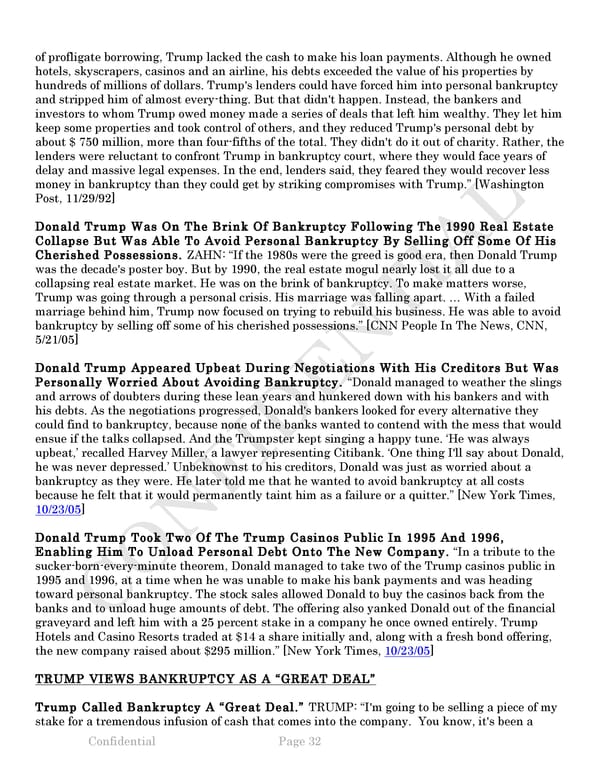of profligate borrowing, Trump lacked the cash to make his loan payments. Although he owned hotels, skyscrapers, casinos and an airline, his debts exceeded the value of his properties by hundreds of millions of dollars. Trump's lenders could have forced him into personal bankruptcy and stripped him of almost every-thing. But that didn't happen. Instead, the bankers and investors to whom Trump owed money made a series of deals that left him wealthy. They let him keep some properties and took control of others, and they reduced Trump's personal debt by about $ 750 million, more than four-fifths of the total. They didn't do it out of charity. Rather, the lenders were reluctant to confront Trump in bankruptcy court, where they would face years of delay and massive legal expenses. In the end, lenders said, they feared they would recover less money in bankruptcy than they could get by striking compromises with Trump.” [Washington Post, 11/29/92] Donald Trump Was On The Brink Of Bankruptcy Following The 1990 Real Estate Collapse But Was Able To Avoid Personal Bankruptcy By Selling Off Some Of His Cherished Possessions. ZAHN: “If the 1980s were the greed is good era, then Donald Trump was the decade's poster boy. But by 1990, the real estate mogul nearly lost it all due to a collapsing real estate market. He was on the brink of bankruptcy. To make matters worse, Trump was going through a personal crisis. His marriage was falling apart. … With a failed marriage behind him, Trump now focused on trying to rebuild his business. He was able to avoid bankruptcy by selling off some of his cherished possessions.” [CNN People In The News, CNN, 5/21/05] Donald Trump Appeared Upbeat During Negotiations With His Creditors But Was Personally Worried About Avoiding Bankruptcy. “Donald managed to weather the slings and arrows of doubters during these lean years and hunkered down with his bankers and with his debts. As the negotiations progressed, Donald's bankers looked for every alternative they could find to bankruptcy, because none of the banks wanted to contend with the mess that would ensue if the talks collapsed. And the Trumpster kept singing a happy tune. ‘He was always upbeat,’ recalled Harvey Miller, a lawyer representing Citibank. ‘One thing I'll say about Donald, he was never depressed.’ Unbeknownst to his creditors, Donald was just as worried about a bankruptcy as they were. He later told me that he wanted to avoid bankruptcy at all costs because he felt that it would permanently taint him as a failure or a quitter.” [New York Times, 10/23/05] Donald Trump Took Two Of The Trump Casinos Public In 1995 And 1996, Enabling Him To Unload Personal Debt Onto The New Company. “In a tribute to the sucker-born-every-minute theorem, Donald managed to take two of the Trump casinos public in 1995 and 1996, at a time when he was unable to make his bank payments and was heading toward personal bankruptcy. The stock sales allowed Donald to buy the casinos back from the banks and to unload huge amounts of debt. The offering also yanked Donald out of the financial graveyard and left him with a 25 percent stake in a company he once owned entirely. Trump Hotels and Casino Resorts traded at $14 a share initially and, along with a fresh bond offering, the new company raised about $295 million.” [New York Times, 10/23/05] TRUMP VIEWS BANKRUPTCY AS A “GREAT DEAL” Trump Called Bankruptcy A “Great Deal.” TRUMP: “I'm going to be selling a piece of my stake for a tremendous infusion of cash that comes into the company. You know, it's been a Confidential Page 32
 Donald Trump Report-DNC Page 33 Page 35
Donald Trump Report-DNC Page 33 Page 35